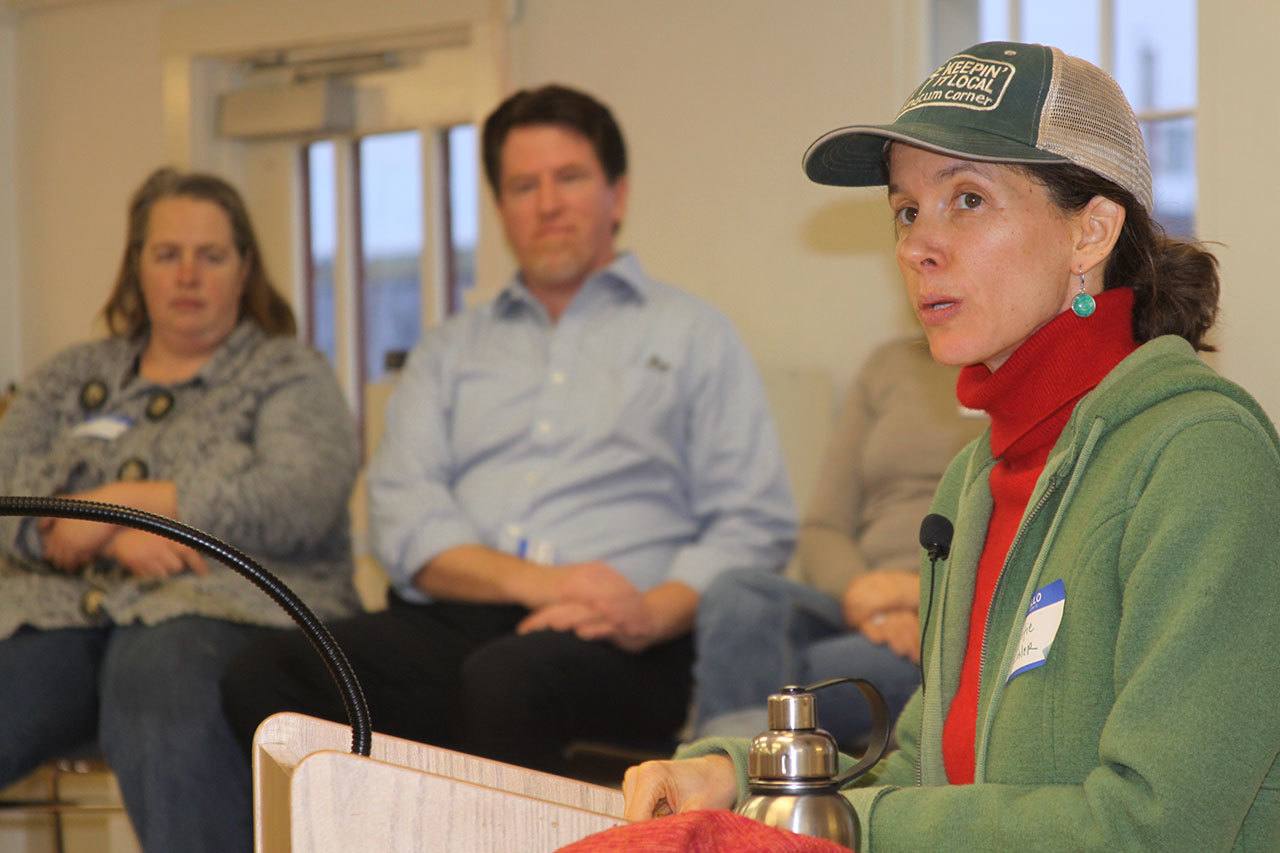At a time when innovative marketing ideas were taking root in surrounding areas to promote local agriculture, a group of farmers and residents from Whidbey Island worked to create its own brand in a effort to bring an identity to what’s produced on the island.
In 2009, the “Whidbey Island Grown” brand was born, complete with signage, stickers, a website and a pile of nifty twist ties.
The idea was ambitious but it couldn’t build enough momentum or sustain necessary funding to carry it much beyond the launch.
Now, sentiment is growing on the island to reboot the project. Supporters think the timing is right.
That topic was the focus of a Whidbey Farm to Table Forum at the Coupeville Rec Hall Monday. It was sponsored by the Whidbey Island Conservation District and Northwest Agriculture Business Center.
Farmers, restaurant owners, caterers and others interested in the concept filled the building to learn about efforts to relaunch the campaign and discover what they can do to help.
The idea is to collaboratively promote Whidbey as a world-class culinary destination. That would benefit farmers who grow crops on the island but also restaurants and caterers who serve them.
“The first attempt was a good idea, but I think it was slightly premature,” said Karen Bishop, a Coupeville farmer and manager of the Whidbey Island Conservation District.
“We’ve seen such an increase in the number of farms and the emphasis and support for local food that, I think, we’re more positioned now.”
Vincent Nattress, chef and owner of Orchard Kitchen in Langley, served as moderator for the event. A group of panelists, mostly farmers and restaurant owners from off-island, shared examples of how such agriculinary marketing efforts can be fruitful.
Two farmers shared how building creative maps generated excitement in the food grown and sold in their areas.
“We started our own called the Bow-Edison Food Trail,” said Harley Soltes, who runs Bow Hill Blueberries, a five-acre organic blueberry farm in Skagit County.
Good reviews about the food produced in Bow and Edison led to broader props as a culinary destination.
A newly group known as the Whidbey Island Growers Association started holding monthly meetings more than a year ago and began discussing the relaunch of the Whidbey Island Grown brand.
The first attempt to promote the brand was managed primarily with part-time staff support from the Northwest Agriculture Business Center and volunteers. A grant was secured to fund the startup.
“When NABC starts a project with grant funding, the intent is to launch the project so that it supports and sustains itself,” Bishop said.
“And because I think it was a little bit before its time, I think it suffered from that failure to launch.”
Whidbey Island Conser-vation District was awarded a grant to help coordinate a new marketing piece and larger marketing effort.
The NABC is applying for grants in an effort to seek longterm funding.
The hope is to start recruiting members and partners for the Whidbey Island Grown project this spring and launch the campaign by summer or fall.
“I think it’s an excellent idea,” said Liz Sherman, a squash farmer who helps run Sherman’s Pioneer Farm Produce in Coupeville.
“I think everything is more ripe now than it was 10 years ago.”
“I think the forum is an important next step,” Nattress said. “I think what we’re trying to do is to come up with a clear vision of what a mature food economy looks like so as we look forward five years and 10 years, what are the pieces that need to be in place and how can we capitalize on what’s here now to get us there?”
The goal is for major markets such as Seattle to recognize Whidbey as a place synonymous with great food, Nattress said.
“Those two things collaboratively help restaurants, they help caterers, they help wedding venues, they help restaurants like mine, they help farmers,” he said.
Crystie Kisler, who owns Finnriver Farm & Cidery in the Chimacum Valley on the Olympic Peninsula, served as the keynote speaker at the Whidbey forum.
She shared how collaborative efforts helped convert her you-pick blueberry farm to a cidery and how working together to reach common goals led to the Olympic Culinary Loop, which promotes Olympic Coast cuisine and has benefited food producers and restaurants in four counties that circumnavigate Olympic National Park.
“The magic of collaboration began for us when we committed to making these relationships,” Kisler said. “We joined every possible association we could think of.”
Instead of fearing the emergence of more “quirky cideries” that have come to Jefferson County, Kisler said she’s embraced them as they’ve added value to the greater Port Townsend area’s reputation as a cidery destination.
She said she gets the most value from her business’s association with the Olympic Culinary Loop when she attends quarterly meetings.
“It’s been powerful,” she said.



